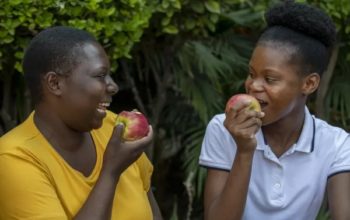By: Marcia Zali
Section 25 in the Bill of Rights, states that everyone has got the right to property and that no one may be deprived of property.
But for a Somkhele resident in Kwa-Zulu Natal, Sifiso Sangweni, this right has been under threat since 2007 when Tendele mine started operating in his backyard.
According to Sangweni, the mine has tried every trick in the book to frustrate and isolate him from his family and community over his refusal to relocate from his ancestral land.

When most of his neighbours and relatives succumbed to what he described as a raw deal, the retired father of seven and husband remained resolute that only a fair compensation and him being given the choice to choose where he wants to be relocated to, would convince him to give up his land to the mine.
“I was never informed that the mine would be erecting a fence a few metres behind my house until I received a call while I was at work. That on its own showed me that the mine did not respect us and had no regard for us,” said Sangweni.
The mine, which has temporarily halted operations following a court order from the Pretoria High Court, did not only stop at erecting a fence without informing Sangweni. Division was caused in his family when there was a disagreement between him and his brothers over whether they should accept the mine’s offer.
Born into a polygamous family of 14 children, some of Sangweni’s siblings accepted the offer and relocated. He now lives with his 82-years-old mother, his wife and children.
He believes that this is the reason why the mine had been “hostile” towards him.
“They have been making life unbearable for my family and I. For instance, they would send a water tanker to fill up the Jojo tanks in the village but the tanker would go to everyone’s yard, except for mine. Everyone else would get compensation for their dead livestock that wandered into the mine grounds but I never got any compensation,” he explained.

For Sangweni, the mine has not improved the lives of his community but has instead made their living conditions worse.
Despite some of the few job opportunities that were created, those who relied on subsistence farming like him, have watched their livestock perish right in front of their eyes, leaving them helpless and disappointed.
He explained that,” everyone would like to see their village being developed and everyone getting opportunities to improve their lives. We now have to buy water since our drinking water has been contaminated by mine dust. Our livestock no longer have safe drinking water because the nearby rivers have gone dry. Even the bridge that the mine built collapsed because of poor construction.”

A walk into the village and you can see visibly dark and cracked houses and windows. The walls outside every home including the trees, are covered with what the residents say is mine dust.
“All of this has left us with no hope. No one from our government has intervened on this issue, instead, some departments are even on the side of the mine and this has been disappointing because one would expect the government to be on the side of the people,” Sangweni added.


All hope is lost
A study commissioned by AllRise, a non-profit organisation and registered law clinic for climate and environmental justice that has been representing community members affected by the open-cast mine, found that opencast coal mining in Somkhele has had profound adverse psychological impacts of a collective traumatic nature on those living on the fence lines.
YOU MAY ALSO READ THIS:
https://www.alexreporter.co.za/2022/11/10/david-vs-goliath-an-investigation-into-the-decade-long-conflict-over-land-between-tendele-mine-and-umfolozi-community/
Some of the families that were interviewed during the study were found to have suffered from chronic traumas and stressors, including violence, environmental assaults, poor health and other daily reminders of significant loss.
There was also a loss of trust on traditional leadership as well as the government, stated the report. Which went on to suggest that the affected communities undergo psychological interventions should address injustices that make living in this opencast coal mining area psychologically harmful.
A lot to lose
Not only the Sangweni family, but other families as well, are objecting to being uprooted from their ancestral lands in order to make way for the mining expansion.
*Malusi Sithole has been keeping up with the legal battles pitting the Mfolozi Community against Tendele/Somkhele Coal Mine as he’s pinning his hopes of remaining in Ophondweni village.
Sithole has been working with Mfolozi Community Environmental Justice Organisation for more than six years in an effort to stop the expansion of Somkhele mine, which would force some families, like his, to relocate to a different neighbourhood.
He is said to have voiced his extreme opposition to the relocation procedure in 2017 when he was informed of it.
Sithole said tension has grown between individuals who wish to accept compensation from the mine and community members opposed to the relocation.
“The folks living across the street detest them so much because they perceive them as people getting in the way of them generating money, but we also don’t like them because we see them as selling ours,” he said.
“We no longer trust each other, that’s the problem and that division and tension is brought by this mine.”
According to him, the relocation process, which divided the community, was not beneficial at all.
“The digging of people’s graves has been painful to watch,” he told Alex Reporter.
Moving to a different location would never make sense for Sithole because he now operates his successful enterprises from a large, vast rural property with animals and hens roaming in the large yard.
“I work and live comfortably here, so why do I want to be moved to a place with a small yard? This is the life I prefer for myself and my livestock. How would I be able to do what I do if they were to move me?” he asked.
Some of the families who were uprooted to make room for the mine had extremely modest homes constructed by the company, and their yards pale in comparison to Sithole’s enormous one. Although he was not opposed to growth in the neighbourhood, he stressed it should not violate residents’ rights to their own land.
He emphasised the importance of security, urging for stronger protection for those opposed to the move, given the assassinations that have occurred in Mfolozi connected to the mine tension.
Sithole said that he stopped going to mining consultation sessions because he no longer felt secure after the murder of a mining rights activist, shootings in other areas, and various threats against individuals who are against relocation.
Additionally, he said that the relocation of families was not being done properly since some families were being offered bribes to move from their ancestral lands. He said that the procedure was opaque and that people’s homes were undervalued.
“They gaze at your home and offer you money, which in my opinion is robbery,” he said.
Why stand against development?
Business Development Manager at Tendele Mine, Nathi Kunene, said the fence erected was around the mine’s boundary and not Mr Sangweni homestead. Meant to be a safety barrier, the fence had been cut on several occasions, resulting in the livestock wandering on the mine premises.
Kunene further stated that the mine had on several occasions engaged with Sangweni regarding compensation for his livestock.

“In an effort to avoid unequal compensation for livestock claim, this matter was discussed in a consultative structure called Mpukunyoni Community Mining Forum (MCMF) in order to agree on reasonable amounts. After such deliberations with leaders, it was agreed that a cow will be compensated at R10 000 whilst the goat at R2000,” said Kunene.
On the issue of contaminated water, the mine said that complainants would not come forward or their Jojo tanks would be empty when the mine tried to test the water. On the occasions where the mine was able to test the water, there was no evidence of coal dust, meaning that contaminants found “did not” originate from the mine.

Up to 225 households had been relocated so far and a further 133 families signed relocation agreements from Emalahleni and Ophondweni.
“None of the families were forced to sign agreements but have done so under their own free will,” responded Kunene.
During public participation meetings that were held from 1 October, 394 families, or 94% of the votes in favour of the mine operating in the area.
Kunene said, “Based on the above results, the TC confirmed that the affected community members in Emalahleni and Ophondweni have consented, in accordance with IPILRA, to Tendele undertaking mining activities in their areas.”
“Tendele will substantially benefit the community and in line with the Government’s Just Transition Policy will assist the community with economic development,” he explained.
The Department of Minerals and Resources had not responded to questions sent to them at the time of publication.
‘This story was made possible with support from the Internews ‘INSPIRES project’




